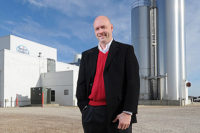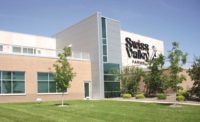Northeastern Iowa was shaped by the glaciers and the Mississippi River, which makes up its eastern border. The landscape here defies the stereotype of Midwestern flatness. Rolling hills yield unexpected delights for motorists negotiating the winding county roads. In Clayton County, as U.S. Highway 18 curves west just outside of Monona, silos appear on the horizon. These are the tallest structures in the county and they belong to Swiss Valley Farms, which operates a cheese and whey powder manufacturing facility in Luana, population 241.
The Luana plant runs 24 hours a day, every day of the year. Swiss Valley Farms considers this to be the flagship among its six facilities. Others are in St. Olaf, Iowa; Minnesota (Spring Valley and Faribault) and Wisconsin (Mindoro and Shullsburg).
The dairy cooperative, headquartered in Davenport, Iowa, uses milk from its farmer-members (see related article on page 54). There are 72 members living in Clayton County and their farms produce more than 101 million pounds of milk a year. The 90-plus workers in Luana process the milk into 27.5 million pounds of Swiss cheese, 16.2 million pounds of whey powder and 5.7 million pounds of cream cheese. Swiss Valley Farms sells these foods locally, throughout the United States and in Asia and Latin America. The co-op’s customers include wholesalers, restaurants and distributors.
Cheesemaking starts with milk. Ten pounds of milk yield one pound of cheese. Luana accepts 20 to 22 milk tankers every day. The four-bay receiving facility can accommodate two semis and two short trucks. There is an on-site lab, registered on the Interstate Milk Shippers list, where technicians screen each delivery for antibiotics and milk components. The lab performs other tests, including in-process testing and final analytical analysis of Swiss cheese, cream cheese and whey products. Every vat of cheese, every blender of cream cheese and every lot of whey powder are sampled to assure the products meet Swiss Valley Farm’s specifications. After all samples have been analyzed, the results are reviewed by the Quality Assurance department. The results are shared at regular technical meetings to keep all departments informed. (External labs perform pathogen testing.)
Swiss Valley Farms acquired the plant in 1967 when it merged with the Northeast Iowa Dairy Cooperative in 1967. Since then, Swiss Valley Farms has expanded the facility several times over the years and keeps investing in new processing equipment that helps assure consistency of product from season to season. A recent investment is an ultra-filtration membrane system which “helps us maintain a consistent yield year round while producing the same quality of cheese,” says plant manager Colin Rowe.
Here’s how an ultra-filtration membrane system maintains consistency: The components in milk vary from winter to summer due to the cow’s stage of lactation. In the summer, low butter fats and proteins lower yields (the milk-to-cheese ratio). The lower solids also affect the attributes of cheese. So cheesemakers turn to milk standardization systems (like ultra-filtration) to even out the seasonal fluctuations in butterfat and proteins. Doing so allows cheesemakers to produce different recipes, like low-fat and high-fat cheese, consistently.









